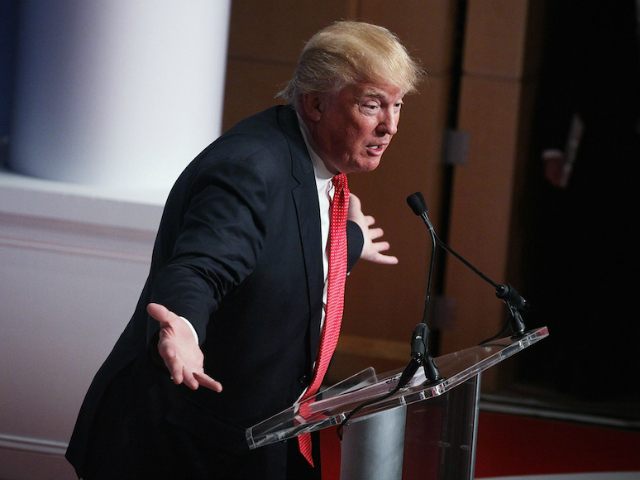Establishment Republican senators up for reelection have “succumbed” to Donald Trump’s America-first trade platform, Politico reports.
The report notes that after years of championing multi-national trade deals, Republican senators who are facing contentious reelections are now rhetorically “sprint[ing] away” from their previous support of President Obama’s Trans-Pacific Partnership agreement.
Opposing the Trans-Pacific Partnership has been a central platform of Trump’s presidential campaign.
Politico writes, “The GOP’s unshakable faith in free trade has been decidedly broken in the year of Trump — with everyone from a former U.S. trade representative, Rob Portman of Ohio, to free-market devotee Marco Rubio of Florida striking a much different tone.”
By “free trade,” the report is referring to what trade experts, such as Nucor Steel Chairman Daniel DiMicco, have described as “unilateral trade disarmament and enablement of foreign mercantilism.”
“[T]he Republican sprint away from the TPP is a remarkable policy reversal for a party that has traditionally championed itself as the party of free trade,” Politico writes.
Indeed, just last year, Republican Senate leaders issued an internal messaging memo to all GOP senators, an exclusive copy of which was obtained and published by Breitbart News. The memo urged GOP senators to meet with business groups during the August recess to tout the GOP’s vote to fast-track Obama’s TPP.
Politico further notes that for several of the senators now rhetorically distancing themselves from the TPP, this represents a complete reversal from their prior statements.
The report states that in April of 2015, Marco Rubio “wrote an op-ed in The Wall Street Journal and urged passage of TPP.” Rubio then delivered the sixtieth and deciding vote to fast-track the TPP. No deal placed on fast-track has ever been blocked, which is why, at the time, Sen. Jeff Sessions suggested that voting to give Obama fast-track authority was essentially a proxy vote for TPP. In an interview with Politico, Rubio appears to now be refusing to take a position on the multinational trade deal that he previously voted to fast-track. However, Rubio did tell Politico that he supports TPP as a concept.
“TPP as a concept is something I support. I’d love to have a free trade agreement with the Asia-Pacific region. But it has to be the right deal,” Rubio said.
Politico notes that other senators, such as Sen. Ron Johnson from Wisconsin, have “simply declined to answer questions about their TPP position.”
“Wisconsin Sen. Ron Johnson has yet to take a stance on TPP and declined in an interview to say whether he even has any concerns,” Politico writes.
Politico notes that with Trump as the party’s standard bearer, “establishment-minded Republicans” up for reelection have been forced to walk a “tightrope” between trying to appeal to Republican voters–who are skeptical of so-called “free trade”–and appease Republican donors and organizations like the Chamber of Commerce and Club for Growth that lobby for more global trade:
The upended politics of trade offer a major conundrum for establishment-minded Republicans running for reelection this year, particularly in Rust Belt states that could help determine control of the Senate next year. Perhaps more than any other issue, trade has illustrated the tightrope GOP candidates have to walk in trying to appeal to Trump-fueled voters while not abandoning the GOP’s core economic principles.
Polling data shows Republican voters are among the most skeptical of so-called “free trade” deals, more so than Democrats. According to Pew, only a vanishing 11 percent of Republican voters believe that so-called “free-trade” will raise wages. By a nearly 5-to-1 margin, Republican voters believe that so-called “free trade” depresses wages, rather than increases wages, and by a greater than 3-to-1 margin, Republican voters believe that “free trade” will kill jobs, not create them.

COMMENTS
Please let us know if you're having issues with commenting.